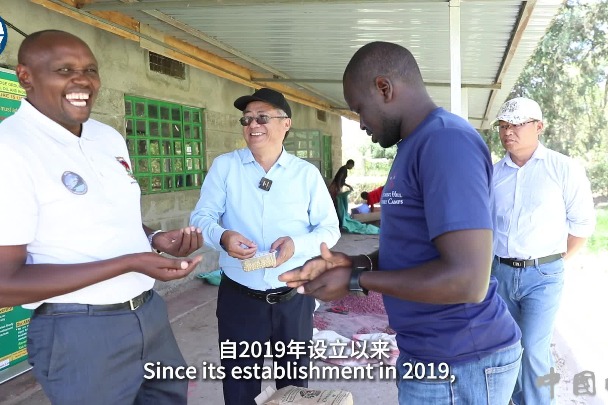Chinese herbal medicine finds common ground in Africa

CHANGSHA -- Traditional Chinese Medicine (TCM) has emerged as a focal point of China-Africa cooperation during the ongoing third China-Africa Economic and Trade Expo in Changsha, the capital of central China's Hunan Province.
During the expo, representatives from Nigeria signed a TCM service project with Shijiazhuang Yiling Pharmaceutical Co., Ltd., a prominent company specializing in TCM. The company is renowned for producing the widely recognized Lianhua Qingwen capsule, which gained recognition as an important Chinese medicine in the fight against COVID-19.
Explaining the significance of the deal, Sun Xuefei, general manager of the company's international trade center, said that four of the company's TCM products, including Lianhua Qingwen, which have been officially registered in Africa, will not only be available for sale through pharmacies in Nigeria but will also be used in Nigerian hospitals.
The company has registered its TCM products in eight African countries including Zimbabwe and Kenya.
For the first time in the expo's history, a forum on cooperation in the field of TCM was held. First launched in 2019, the expo has become a major platform for strengthening economic and trade cooperation between China and African countries.
Speaking at the forum, Huang Luqi, deputy director of the National Administration of Traditional Chinese Medicine, said that through cooperation with relevant African institutions, China has established overseas TCM centers in African countries such as Morocco, Zimbabwe and Mauritius.
During an interview with Xinhua, Martin Chedondo, the ambassador of Zimbabwe to China, said that Zimbabwe's trade delegation to the expo hopes to explore opportunities to bring home herbal planting, processing, and laboratory testing technologies in order to establish a whole TCM industry chain and attract local companies into the industry.
"In China, I've seen huge fields of herbal plants. We really want something like that in Zimbabwe," the ambassador said.
Zhu Wei, the head of the 19th Chinese Medical Team to Zimbabwe, who just completed a one-year mission and returned to his home in Changsha in March, met a lot of African friends at the expo.
"The expo has witnessed the presence of numerous African dignitaries and entrepreneurs, who have shown great interest in Chinese medicine and acupuncture," said Zhu, who is also the deputy director of the acupuncture and massage rehabilitation department of the Hunan Provincial Hospital of Integrated Traditional Chinese and Western Medicine.
According to Zhu, Africa boasts resources of high-quality medicinal herbs, and there is a great need for further cooperation and exchanges between China and Africa in various fields of traditional medicine, including trade, cultivation, research and development.
Zhu said that during his time in Zimbabwe, his team undertook the TCM training program for local talents, and saw the graduation of the first batch of traditional Chinese medicine and acupuncture personnel last year.
Onyebuchi Chiamaka Henrietta, a Nigerian graduate student at the Central South University in Changsha, volunteered to promote specialties at the Nigerian booth at the expo.
"In Nigeria, we use dried ginger in very similar ways to China. You can boil it in water to drink for treating minor illnesses, or stew meat with it," she said fluently in both Chinese and English, as visitors gathered around a display of various agricultural specialties, including dried ginger, cashew nuts and sesame seeds.
Diarra Boubacar, vice president of the Federation of China-Africa Friendship Association, has been promoting exchanges between TCM and African traditional medicine for many years.
Boubacar, who hails from the Republic of Mali in West Africa, came to China to study TCM in 1984. He obtained a doctorate in Chinese medicine from the Chengdu University of TCM in 1997.
He told Xinhua that he is working on a book with the theme of mutual learning between Chinese and African herbal medicines. He tries to collect and analyze information on the similarities and differences in the use and efficacy of herbal medicines, such as Albizzia julibrissin, which are used in both Chinese traditional medicine and African traditional medicine.
Themed "Common Development for a Shared Future," the four-day expo opened on Thursday and will be attended by representatives from 53 African countries and multiple international organizations.
The number of exhibitors has reached 1,500, up 70 percent from the previous expo. A myriad of African products, ranging from Kenyan roses to Egyptian fragrances, is on display, with traders utilizing the expo to explore the vast Chinese market.
- News
- China launches international cooperation initiative in open science with Brazil, South Africa, African Union
- China to send 1,500 packs of sports equipment to several BRI countries
- China's agricultural innovation helps African farmers increase yield, income
- Chinese medical team in Namibia promotes child health on World Children's Day




